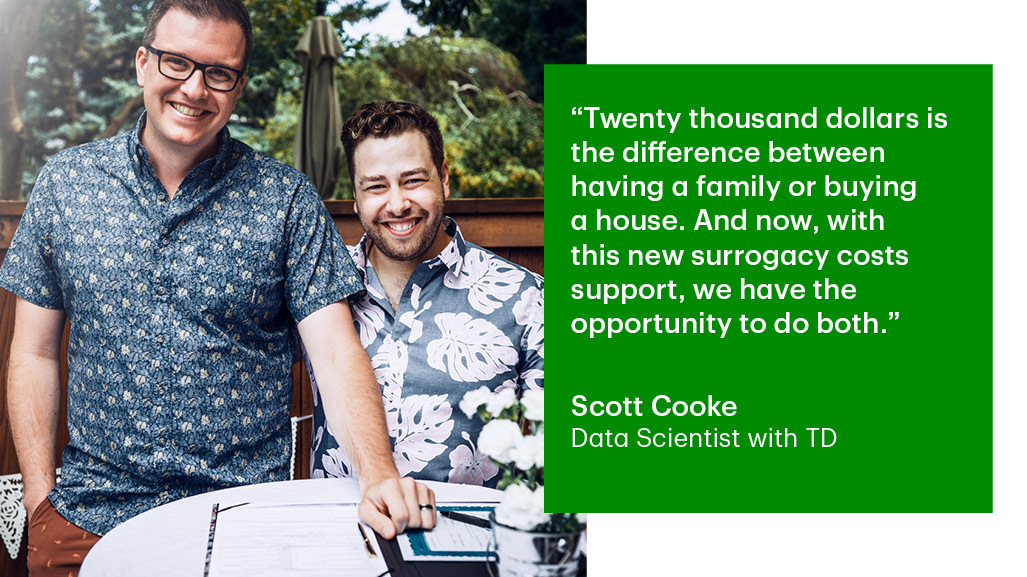When Scott Cooke and his husband made the decision to start a family through surrogacy, they dove headfirst into the process. They shared their plans with friends and family, found a surrogacy lawyer, and even found two women in their lives who offered to serve as egg donor and surrogate, respectively.
But surrogacy can be a lengthy and expensive process, and the couple were concerned about a potential lack of support in one key area: employer benefits coverage.
Cooke, a Data Scientist with TD, inquired with Human Resources (HR) about his options. When the Benefits and Well-being team in HR reached out to him for a meeting, Cooke wasn't expecting a positive response.
Instead, Cooke received what he calls "life-changing" news. TD was updating its benefits policies in a way that would most likely have an immediate impact on families like Cooke's.
In response to feedback from colleagues and to better reflect the diversity of Canadian families, TD enhanced its family planning benefits as of March 1, 2022, to include coverage for fertility and reproductive treatments, support for surrogacy and donor costs, and support for adoption costs, in addition to maintaining current fertility drug coverage. There is a $20,000 lifetime maximum for each of these benefits.
"Twenty thousand dollars is the difference between having a family or buying a house," Cooke said. "And now, with this new surrogacy costs support, we have the opportunity to do both."
How much do employer benefits cover for surrogacy in Canada?
"Many people aren’t aware of the cost of creating a family if you can't do it naturally," said Tara Wood, Board President of the fertility advocacy group Conceivable Dreams.
According to the Fertility Benefits Matter campaign – a joint awareness campaign created by Conceivable Dreams and fellow fertility patient group Fertility Matters Canada to encourage employers to improve fertility benefits and raise awareness about the current state of fertility support across Canada – the average cost of one round of in vitro fertilization (IVF) in Canada is approximately $20,000.
Coverage for fertility treatments and procedures through public healthcare varies by province and territory, with some provinces not offering any public funding at all.
Most Canadian employers do not offer fertility benefits through their benefits plans, according to a recent survey from the Fertility Benefits Matter campaign.
Wood said the new $20,000 lifetime maximum for each of the three types of coverage at TD makes it a leader amongst Canadian employers.
"Offering family-friendly benefits is the right thing to do and timely, when we look at the growing investment in diversity, inclusion and equity," Wood said.
"It's a way to attract and retain employees; offering more inclusive benefits is a way for employers to stand out."
Fertility is a medical issue, and Wood is of the opinion that it should be covered under employee group benefits like any other medical condition. And just as companies enact policies around equal pay and equitable representation on boards, employers can also enact policies around supporting women in the workforce by including fertility and reproductive treatments in their benefits plans, such as IVF or freezing eggs.

'There isn't just one way to build a family'
According to Tim Thompson, Senior Vice President of Corporate Evolution and Change Enablement at TD, offering these kinds of benefits recognizes that "there isn’t just one way to build a family."
Thompson is the father of three children, all born through surrogacy, and Chair of the TD LGBTQ2+ Executive Steering Committee.
Over his 32-year career at TD, Thompson said he's seen a "steady evolution" of benefits at TD becoming more inclusive, from being the first bank in Canada to offer employees same-sex spousal benefits in 1994, to recognizing different family structures by expanding policies like maternity leave into parental leave.
"We have this phraseology at TD around bringing your best self to work every day," Thompson said.
"Well, your best self includes everything. You have this whole other life outside work, and that includes eldercare, childcare, and looking after other family members or chosen family."
Whether it's fertility treatments, surrogacy or adoption, Thompson said there are still "artificial barriers" around having transparent and open conversations about these topics in the workplace.
"This needs to change," he said.
"Because if you think about it, there are a lot of different ways people can have a family."
Thompson speaks openly about his surrogacy experience and said having inclusive family planning benefits opens opportunities for TD colleagues to start conversations and find support at work.
"I can stand in front of my colleagues and say, 'Hey, guess what, we offer benefits for surrogacy now. Don't know what surrogacy is? Let me explain,'" Thompson said.
"It's a catalyst for transparency and openness. And this is how you get people to bring their best selves to work: You embrace the whole person."
As Cooke and his husband continue their own surrogacy journey, hearing about the new benefits coverage made him feel like "a giant weight had been lifted." Cooke said he hopes TD leads the way for inclusive family planning benefits to become commonplace for other Canadian employers.
"The process and the costs are daunting, and I think it just turns a lot of people off and makes them think it isn't an option for them," Cooke said.
"As one couple, we don’t have much impact. But as a giant corporation in Canada that employs 90,000 people around the world, TD does have the voice to start impacting change."
